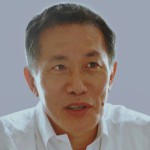[By Tatsuru Uchida, Philosopher and Martial artist]
U.S. president-elect Donald Trump has announced his intention to withdraw from the Trans-Pacific Partnership trade deal on his first day in office. Although the TPP framework was a policy led by the United States, all of the major candidates in the presidential election expressed opposition to the deal in their campaign pledges. Meanwhile in Japan, the Liberal Democratic Party had been clearly against the TPP framework in the 2012 general election, but made a complete turnaround after the election to eagerly promote the framework.
Policy shifts in Japan and the U.S.
What do the policy shifts in Japan and the U.S. represent? If they have not gone insane, changing their stance toward a certain policy means they are not really sure what results the policy could bring about.
Accelerating or restraining globalization – which would be beneficial for the countries’ interests? No scholar or politician in this world knows the right answer to this question. If someone says he or she knows the answer, that person is lying.
Since human beings have never experienced such economic globalization in the past, we have no past success cases to look into in order to make inferences on how we can succeed. We can make assumptions, but they would not be predictions but personal expectations. We have stepped into a zone we have never experienced before.
U.S. voters in 2016 judged that excessive globalization would damage national interests. However, even if the U.S. pulls out of the TPP deal, there is no way it would help revive the nation’s dying manufacturing industry.
On the other hand, if the U.S. ratifies the deal, it is highly likely that the globalization will not stop and the employment situation of the nation’s manufacturing industry will deteriorate. That is why the American people chose the “America First” approach.
Trump’s unrealistic campaign promise of building a wall on America’s border with Mexico is an easy-to-understand reflection of American people’s desire to close the country.
America’s decision to rebuild barriers is a sign that the end of global capitalism has begun. It is the end of the system which has regarded as absolute goodness the world becoming one big market with capital, goods, people and information going back and forth across national borders at ultra-high speed.
How will the world turn out to be in the future? The nation-state system has already started liquefying because of globalization. Regional hegemons such as Russia and China are moving towards restoring the territories they possessed during the Romanov dynasty and the Qing dynasty. While the European Union has lost its sense of direction after failing to maintain its initial aim of establishing the United States of Europe, the U.S., the world’s superpower, is quickly turning to unilateralism.
After reforms comes a cliff edge
“Lost in a fog” is probably the best term to describe the current situation. When you are caught in a fog, you should stop and wait until it clears up and you can see the ridgelines. But in Japan, the perversion of “once you start, you can’t stop” is being tolerated. People seem to feel uneasy for not being busy “reforming” themselves. I understand their feelings to some extent, but if they go on like this, they will fall off the cliffs.
<profile> Born in Tokyo in 1950, Tatsuru Uchida currently serves as professor emeritus of Kobe College and president of Gaifukan, a school for Aikido and philosophy in Kobe. He specializes in modern French philosophy.


